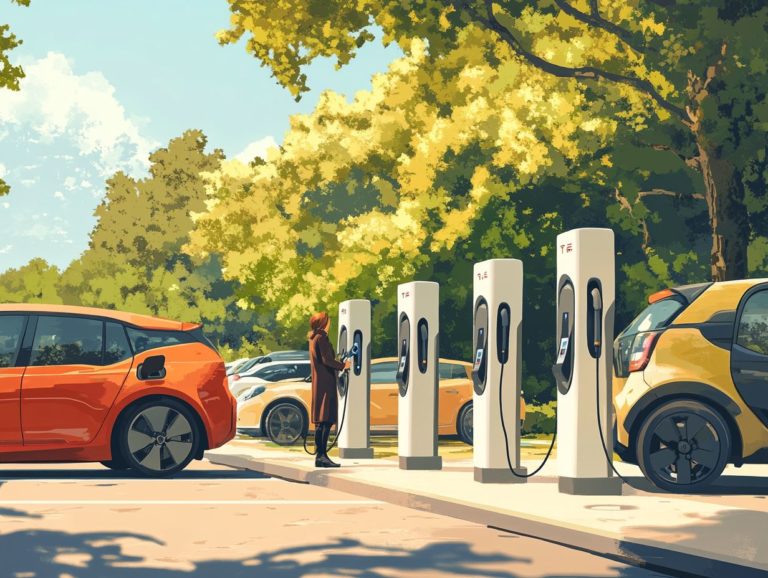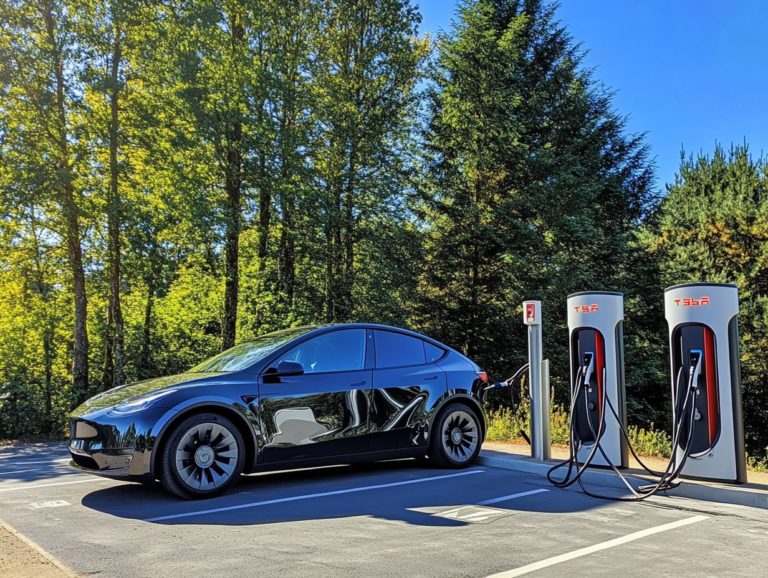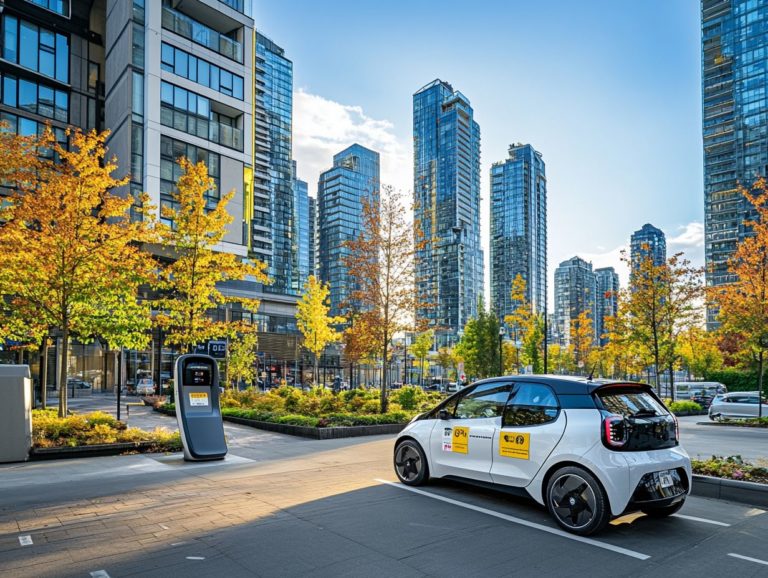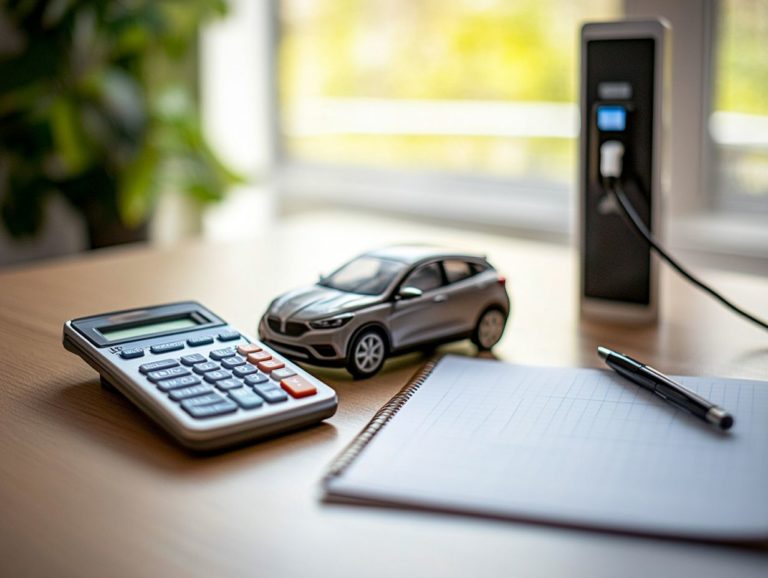How to Choose the Right EV Charger
As electric vehicles (EVs) continue to rise in popularity, understanding the array of charging options available to you becomes crucial.
This article delves into the different types of EV chargers, focusing on important features you should consider when making your selection.
Examine key aspects such as vehicle compatibility, charging speed, and installation requirements.
Whether you’re seeking a charger for your home or a commercial setup, explore your options and find the perfect charger for your needs!
Contents
- Key Takeaways:
- Understanding EV Chargers
- Factors to Consider When Choosing an EV Charger
- Choosing the Right EV Charger for Your Needs
- Frequently Asked Questions
- What factors should I consider when choosing an EV charger?
- What is the ideal power output for an EV charger?
- Can I use any EV charger for my electric car?
- What are the different types of EV chargers available?
- Do I need a professional to install an EV charger?
- What additional features should I look for in an EV charger?
Key Takeaways:
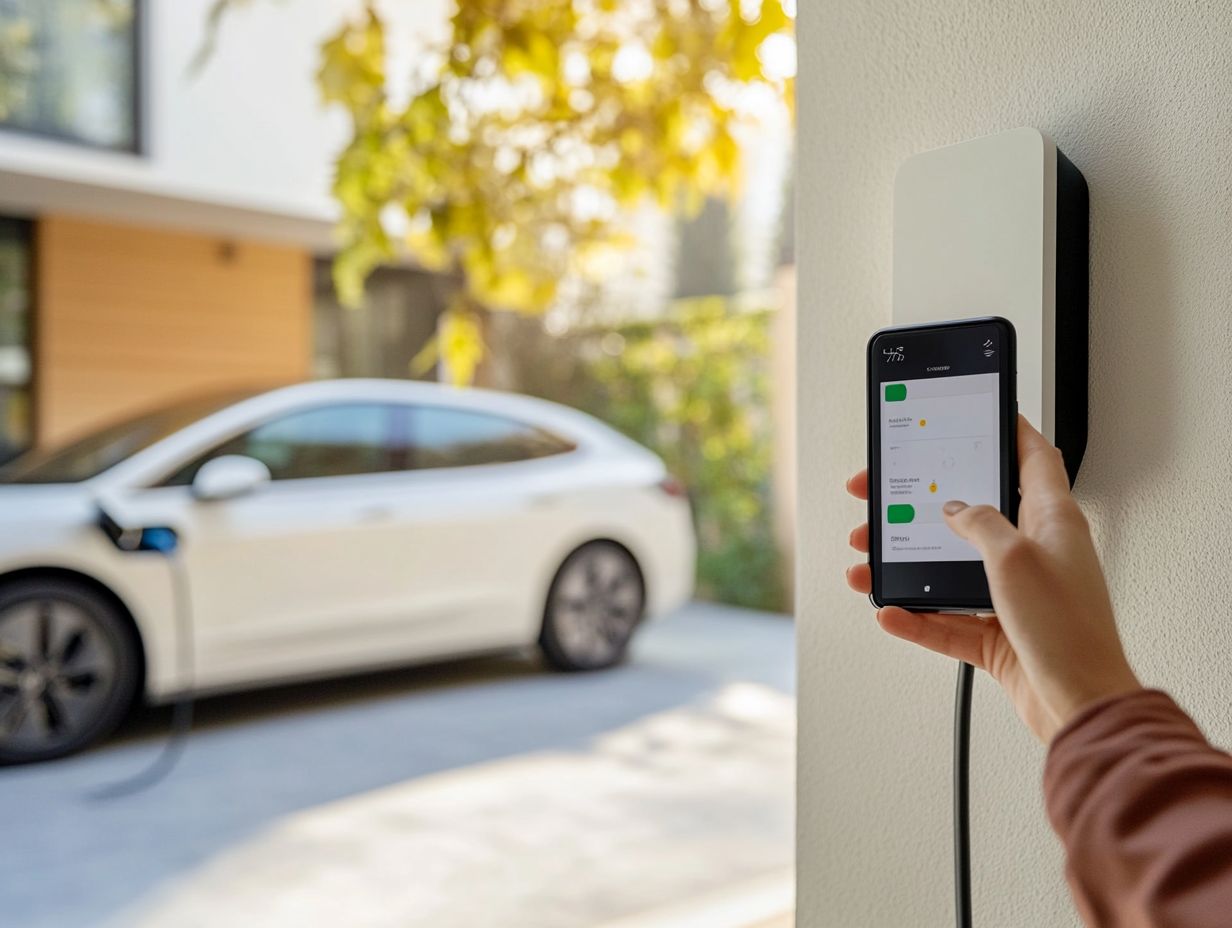
- Consider your vehicle’s compatibility, charging speed, and installation requirements when choosing an EV charger.
- Decide between residential or commercial use, budget and long-term savings, and additional features when selecting the right EV charger.
- Be familiar with the types of EV chargers and their key features to make an informed decision.
Understanding EV Chargers
Understanding EV chargers is essential for anyone contemplating the shift to electric vehicles. These devices make charging at home efficient and convenient.
The right home EV charger can profoundly affect your driving experience, influencing factors such as charging speed, cost, and compatibility with a range of electric vehicle models. For those considering installation, it’s important to understand what to know about installing a home EV charger, including options for Tesla, BMW, and Hyundai.
With various options available Level 1, Level 2, and DC Fast Chargers (which deliver rapid charging) understanding their unique features and benefits enables you to make informed choices that align with your daily charging habits and home electrical setup.
Types of EV Chargers
There are three primary types of EV chargers you should be aware of: Level 1 chargers, Level 2 chargers, and DC Fast chargers. Each one offers different charging speeds and installation requirements.
Level 1 chargers are the simplest option, typically plugging into a standard household outlet. They deliver about 2 5 miles of range per hour, making them perfect for overnight charging at home.
If you re seeking something a bit more robust, Level 2 chargers require a dedicated 240-volt circuit and can provide a generous 10 60 miles of range per hour. These are ideal for both residential setups and commercial locations.
For those moments when you re in a rush, DC Fast chargers come to the rescue, often charging your EV to 80% in around 30 minutes. However, keep in mind that these require a more complex installation process. Each type of charger is tailored to specific needs, catering to everything from your everyday home use to quick top-ups on busy days, ensuring you can select the perfect solution that aligns with your lifestyle and charging habits.
Key Features to Look for
When selecting an EV charger, focus on key features such as charging speed, compatibility with your electric vehicle, and the integration of smart technology (automated features that enhance user control) to elevate your user experience. Additionally, consider exploring how to choose the right EV for your lifestyle for a well-rounded decision.
A fast charging speed is vital; it can significantly reduce the time you spend waiting for your vehicle to recharge, which is particularly important for those with busy lifestyles. Many users appreciate mobile app integration, allowing for real-time energy tracking and charging status updates. This feature helps you track energy use and save money.
It s important to understand EV connectors like J1772 and NACS. These connectors ensure compatibility with a variety of EV models, allowing for seamless charging without the hassle of cumbersome adapters. Collectively, these features work together to enhance convenience and elevate your overall satisfaction with the EV charging experience.
Factors to Consider When Choosing an EV Charger
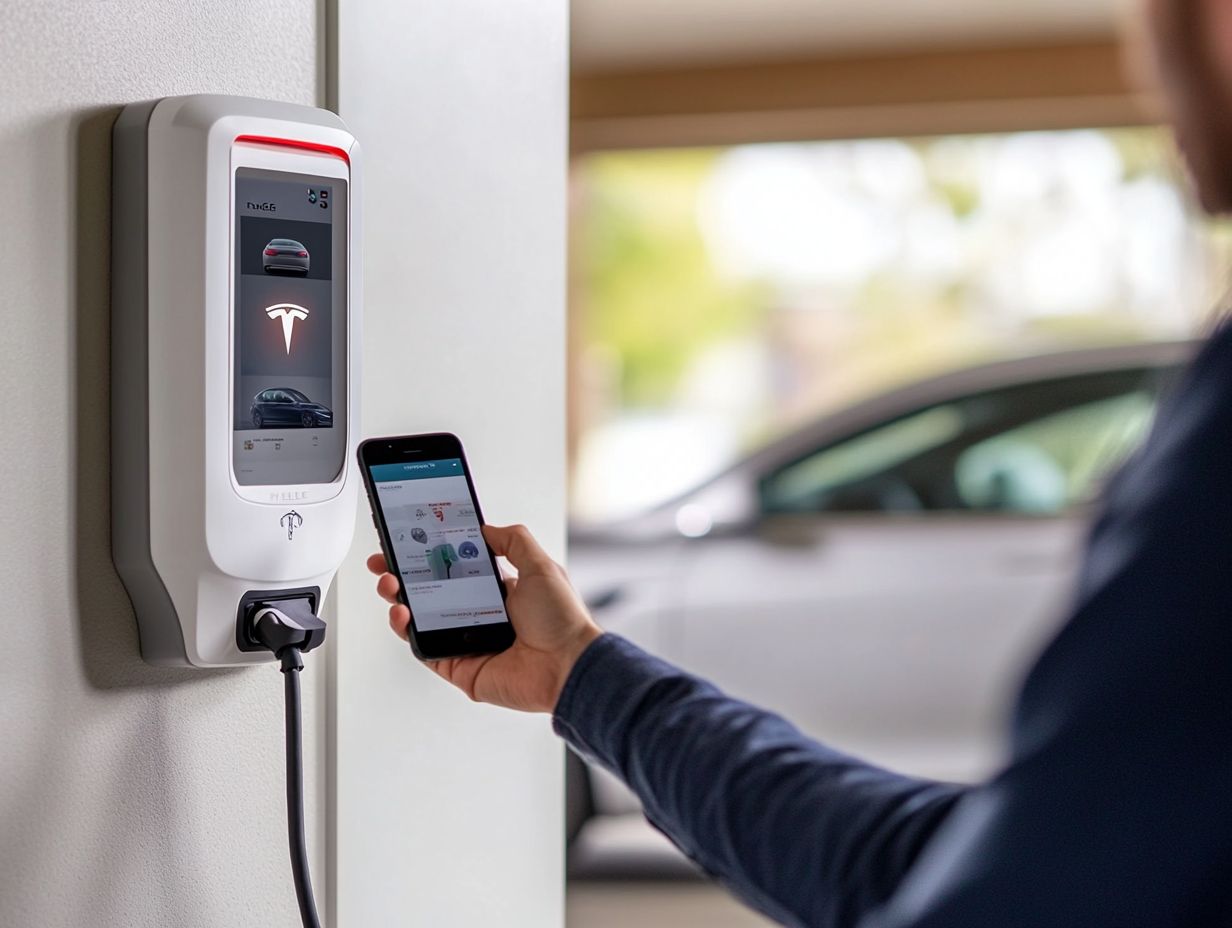
When choosing an EV charger, consider key factors like charging speed, installation costs, and how well it works with your electric vehicle. Understanding these elements will help you find the right EV charger for you that fits your home and driving habits.
Evaluate local electricity rates to make informed choices about charging expenses. This can enhance your overall charging experience.
Vehicle Compatibility
Ensuring vehicle compatibility is crucial when selecting an EV charger. Different electric vehicles require specific connectors and charging standards to operate effectively, so it’s important to understand what to consider when installing a charger.
This compatibility affects charging speed and the vehicle’s power system efficiency. For instance, brands like Tesla, BMW, and Hyundai each have unique onboard chargers designed specifically for their vehicles.
Pairing the right charger with your vehicle is essential. A Tesla will achieve optimal performance with the high-speed Tesla Wall Connector, while Hyundai owners might prefer the best charging solutions for new EV owners that align with their vehicle’s capabilities.
Understanding the range of EV connectors, such as Type 1 and Type 2, as well as DC fast charging options, ensures a seamless charging experience. This minimizes downtime and maximizes travel convenience.
Charging Speed and Time
Charging speed is an important factor for how quickly you can recharge your vehicle. Level 1 chargers are the slowest, providing just 3 to 5 miles of range per hour. This might work overnight but isn’t ideal for longer commutes.
Level 2 chargers are faster, offering 10 to 60 miles of range per hour. This makes them perfect for quick top-offs at work or while running errands.
Then there are DC Fast Chargers, the powerhouses of the charging landscape. They can achieve up to 80% charge in just 30 minutes, making them ideal for long road trips where time is crucial.
Understanding these distinctions can significantly impact your daily routine. The charger you choose affects the convenience and flexibility of your charging process, shaping your overall driving experience.
Installation Requirements and Cost
Installation requirements vary based on the charger type. A Level 1 charger may need just a standard outlet, while Level 2 usually requires a special connection. This could mean upgrading your wiring, affecting your overall costs.
Don’t forget to consider how this might affect your electrical panel. An increased load might necessitate a panel upgrade, adding to your expenses. Installation costs can range from a few hundred to several thousand dollars, influenced by these considerations.
When you weigh this against the long-term savings from reduced fuel costs and possible tax incentives, that initial investment could be worthwhile, elevating your convenience and efficiency to a whole new level.
Choosing the Right EV Charger for Your Needs
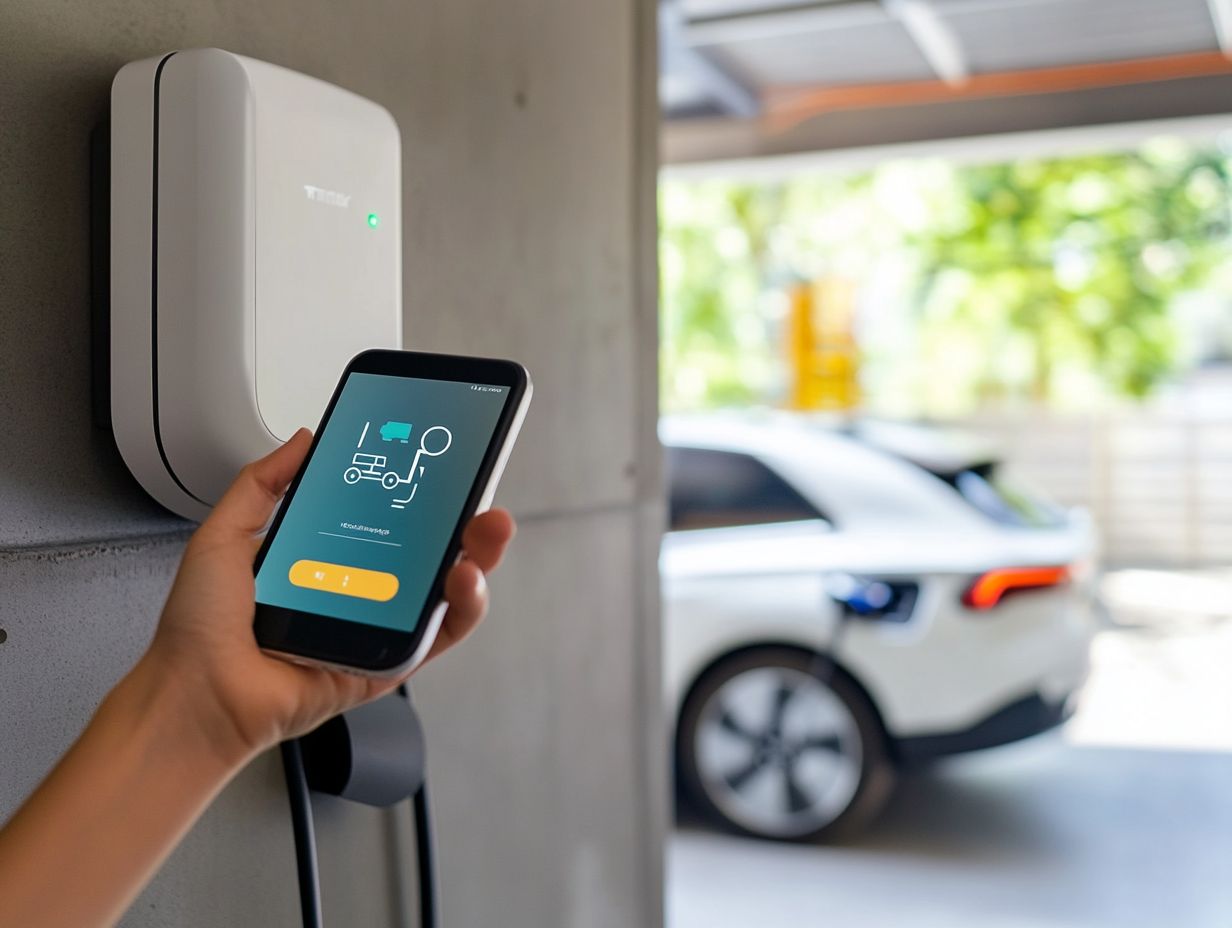
Start by understanding your needs; this is key to finding the perfect EV charger! Whether for residential or commercial use, you should also consider how to identify your ideal EV while keeping an eye on your budget and potential long-term savings.
The right charging solution for your home can greatly enhance your electric vehicle experience. To find the best fit, it’s important to understand how to determine your EV needs, ensuring alignment with your charging habits and lifestyle.
By integrating smart technology and additional features, you can elevate the usability and efficiency of your home EV charger, delivering added value over time.
Residential vs. Commercial Use
Understanding the distinctions between residential and commercial use is essential for selecting the right charging solution.
Residential chargers typically require lower power levels and simpler installations, often catering to one or two vehicles in a home setting. In contrast, commercial applications demand higher volumes of users, necessitating robust, faster charging stations designed for efficiency and reliability.
A compelling option in both scenarios is the dual charging station. This allows multiple vehicles to charge simultaneously, maximizing uptime and convenience.
Moreover, chargers without fixed cables offer flexibility. They accommodate different charging preferences and support a broader range of EV models.
Budget and Long-Term Savings
Budget considerations and long-term savings are pivotal when selecting the right EV charger. To enhance your investment and reduce ongoing operational expenses, it’s essential to understand how to maximize your EV charging experience.
As you evaluate an electric vehicle charging system, factor in installation costs, which can significantly affect your budget. These expenses include the charger itself, as well as wiring, labor, and any potential upgrades to your existing electrical systems.
To alleviate these initial costs, explore available utility incentives. Many local energy providers offer rebates or subsidies for EV charger installations, which can dramatically reduce your upfront expenses.
Don t miss out on potential savings! By taking advantage of time-of-use rates from utilities, you can optimize your charging schedules to tap into cheaper electricity during off-peak hours. Such strategies can lead to significant savings over time, making your investment in an EV charger more financially sound.
For instance, some users have reported recouping their initial investment within just a few years, thanks to these ongoing savings. This underscores the importance of thorough research and planning in your decision-making process.
Additional Features and Accessories
When considering an EV charger, think about how additional features and accessories can enhance your experience. Options like smart technology, mobile app integration, and energy tracking are worth exploring.
Choosing between chargers with fixed cables and those without is essential. Fixed cable options make the charging process effortless, while models without fixed cables give you the freedom to select the cable that best suits your needs.
Modern chargers often sync with your home Wi-Fi network. This enables you to manage charging schedules, receive notifications, and monitor energy consumption all from your smartphone. This level of connectivity allows you to track costs and optimize energy use according to time-of-use rates.
Some chargers even feature load balancing, intelligently distributing power across multiple devices, enhancing the practicality of owning an EV.
Frequently Asked Questions
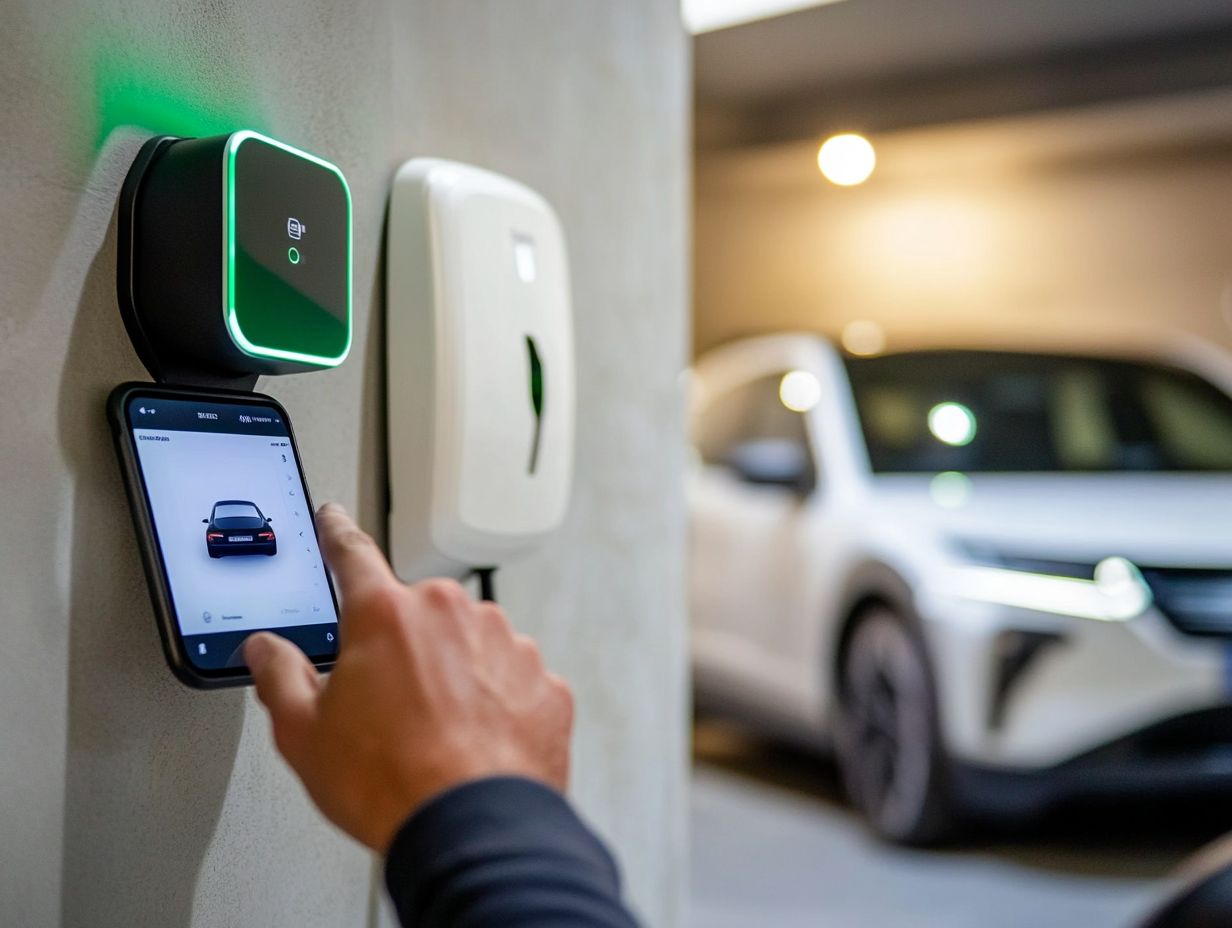
What factors should I consider when choosing an EV charger?
When selecting an EV charger, consider important factors like the charger’s power output, compatibility with your vehicle, installation options, and features such as how to choose the right EV charger, including Wi-Fi connectivity and smart charging capabilities.
What is the ideal power output for an EV charger?
The ideal power output for an EV charger depends on your vehicle’s charging capabilities and your charging needs. Generally, a charger with a power output of 7 kW or higher is recommended for faster charging. However, it’s important to check your vehicle’s specifications to ensure compatibility.
Can I use any EV charger for my electric car?
No, not all EV chargers are compatible with all electric cars. It is crucial to check the charging capabilities of your vehicle and ensure that the charger you choose is compatible. Some chargers may also require additional adapters for specific vehicles.
What are the different types of EV chargers available?
There are three main types of EV chargers: Level 1, Level 2, and Level 3 (DC fast charging). Level 1 chargers use a standard 120-volt outlet and are the slowest option, while Level 2 chargers use a 240-volt outlet and provide faster charging. Level 3 chargers are the fastest option but are less common and typically found only at public charging stations.
Do I need a professional to install an EV charger?
In most cases, it is recommended to have a licensed electrician install an EV charger. This ensures proper installation and compliance with local building codes. Some chargers also offer professional installation services as part of the purchase.
What additional features should I look for in an EV charger?
Some EV chargers offer additional features such as Wi-Fi connectivity, smart charging capabilities, and mobile apps for monitoring and managing charging sessions. These features can provide convenience and control over your charging experience, but they may also come at a higher cost.


